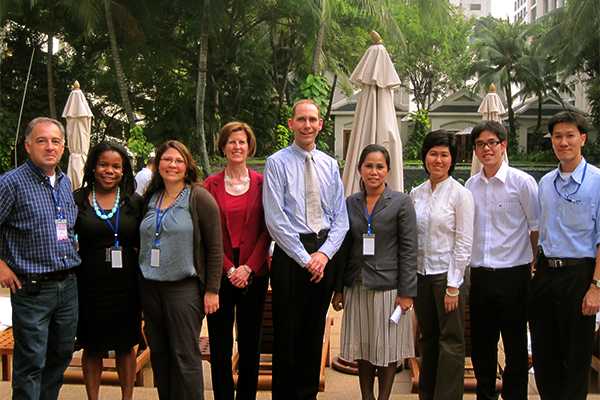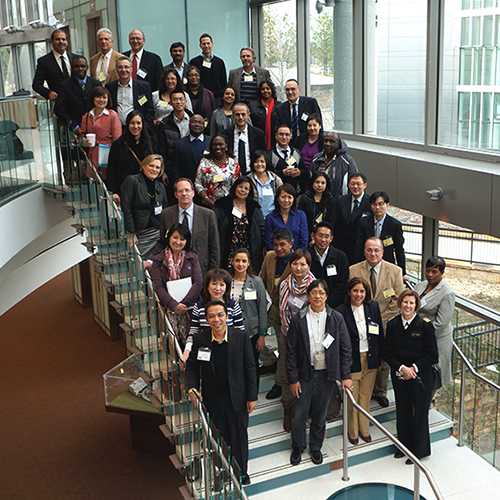Unlikely Allies Formed During Panel Physician Trainings

Luis Ortega, Erika Willacy, Gaby Benenson, Mary Naughton, Drew Posey, Sutisa Rommaneyapet (Mui), Chutatip Taweeksukk (Vikki), and Nuttapong Wongjinadon at the Panel Physician Training Summit in Thailand
Her diminutive stature belies the enormous impact she has had in improving the educational resources and trainings for panel physicians across the world. As a member of the Medical Assessment and Policy (MAP) Team of the Quality Assessment Program (QAP) in the Division of Global Migration and Quarantine’s (DGMQ) Immigrant, Refugee, and Migrant Health Branch; Erika Willacy works to develop a comprehensive training program for panel physicians. Panel physicians are medically trained, licensed, and experienced doctors practicing outside the United States who perform medical examinations for immigrants and refugees seeking to enter the United States. A medical examination is required for all refugees coming to the United States and all applicants for an immigrant visa who live outside the United States. With approximately 700 panel physicians in 150 countries selected by a U.S. Embassy or Consular Section of the United States Department of State (DOS), ensuring all panel physicians receive proper support and training would be a daunting endeavor for the faint of heart; however, Willacy and her colleagues approach the challenge with determination and enthusiasm.
DGMQ develops guidelines, called Technical Instructions (TIs), for the required medical examinations. The TIs cover vaccinations and medical conditions such as tuberculosis, mental health, and sexually transmitted diseases. The tuberculosis Technical Instructions (TB TIs) were updated in 2007 to reflect advances in science and newer, more precise tests. The updated TB TIs are an essential tool to more accurately identify tuberculosis and improve the health of immigrants and refugees through earlier diagnosis and updated methods of treatment. To help ensure a successful implementation, QAP personnel developed a comprehensive training program to provide support, guidance, and technical assistance to panel physicians implementing the revised TB TIs and to help ensure they successfully conduct immigrant and refugee medical examinations.

Participants attending the Panel Physician Training Summit in Istanbul
The Panel Physician Training Summit is an integral component of the MAP Team effort to manage the panel physician program and provide educational opportunities and trainings for them. Since 2008, nine summits have been held in Jordan, Kenya, the Philippines, India, Ghana, the Dominican Republic, Thailand, Peru, and Turkey, with each one improving upon the other. In 2011, the Panel Physician Training Summits in Thailand and Peru, combined, reached over 200 physicians and consular staff from 44 countries. These were followed in 2012 by a summit in Istanbul, Turkey, that was attended by 120 panel physicians and Consular officers. In March, Atlanta, Georgia was the site of the first U.S.-based Intergovernmental Panel Physician Training Summit, with involvement from the Intergovernmental Immigrant and Refugee Health Working Group (IIRHWG; Australia, Canada, New Zealand, the United States, and the United Kingdom) and was sponsored by the International Panel Physicians Association (IPPA). The training summits featured didactic sessions, as well as interactive, case-based learning; panel discussions; videos; and networking for attendees, with the goal of enhancing the knowledge and understanding of the audience and allowing them to turn that knowledge into practice. For the first time, DGMQ hosted workshops that were separate from the formal Summit to allow panel physicians greater in-depth, hands-on time on certain issues. As Willacy states, "DGMQ has an obligation to ensure the successful implementation of the TIs and that panel physicians feel empowered and properly equipped to do so." Training summit organizers and attendees agreed there was a tremendous value in having a face-to-face training with time dedicated to understanding and asking questions about real scenarios. Drew Posey, MAP Team Leader, believes the "greatest thing about the training summits is being able to bring together panel physicians from around the world. It is invaluable to be able to interact with so many at once and for panel physicians to be able to network and share lessons learned with one another." His sentiments mirror that of his colleague, Luis Ortega, Asia Regional Field Program Chief, who considers the training summits a "unique opportunity for panel physicians and consular officers from all over the world to exchange experiences from their practices, discuss solutions to common problems, and provide suggestions and ideas to DGMQ on how to collectively make the required pre-immigration medical examination better."
The Training Summit in Thailand

Intergovernmental Panel Physician Training Summit participants attending DGMQ-sponsored workshops, held at the Centers for Disease Control and Prevention in Atlanta, Georgia.
While the technical aspects of the summit are critical, the importance of the intangible benefits and connections among attendees cannot be overemphasized. For example, while working together on case studies and in small group sessions during a training summit held in Thailand, a group of participants from Pakistan and India bonded over the cricket matches that were in progress. Their shared affinity for the sport was discovered because of the close relationships that develop among panel physicians as a result of the collaborative nature of the summits. Mary Naughton, summit lead for content, believes the summits “provide a welcoming environment for panel physicians to help each other learn how to implement the TIs and give them an opportunity to put into practice what they have learned.” The summits are conducive for sharing ideas, exchanging information, and providing peer support to overcome the challenges panel physicians face in their home countries. The Panel Physician Training Summits are important forums for attendees to work together, share common challenges and solutions, and develop collaborations that likely would not happen without the face-to-face element the summits provide. As one physician from Scandinavia aptly stated, “I have been to many congresses throughout my career and this is by far the best. I have learned so much and made so many valuable connections.”
Looking Ahead to 2014
While the Intergovernmental Panel Physician Training Summit held in Atlanta, Georgia just concluded, planning has begun and excitement is building for the next Panel Physicians Training Summit, which will take place March 2014, in Cape Town, South Africa. Dr. Posey aptly sums up the sentiments of many of those involved: “The panel physicians’ enthusiasm and appreciation for the summit opportunity make me feel fortunate to be a part of the Summits.” The continued work and dedication to hosting the training summits result in successful medical examinations and ultimately healthier immigrants and refugees.
- Page last reviewed: December 23, 2016
- Page last updated: December 23, 2016
- Content source:


 ShareCompartir
ShareCompartir